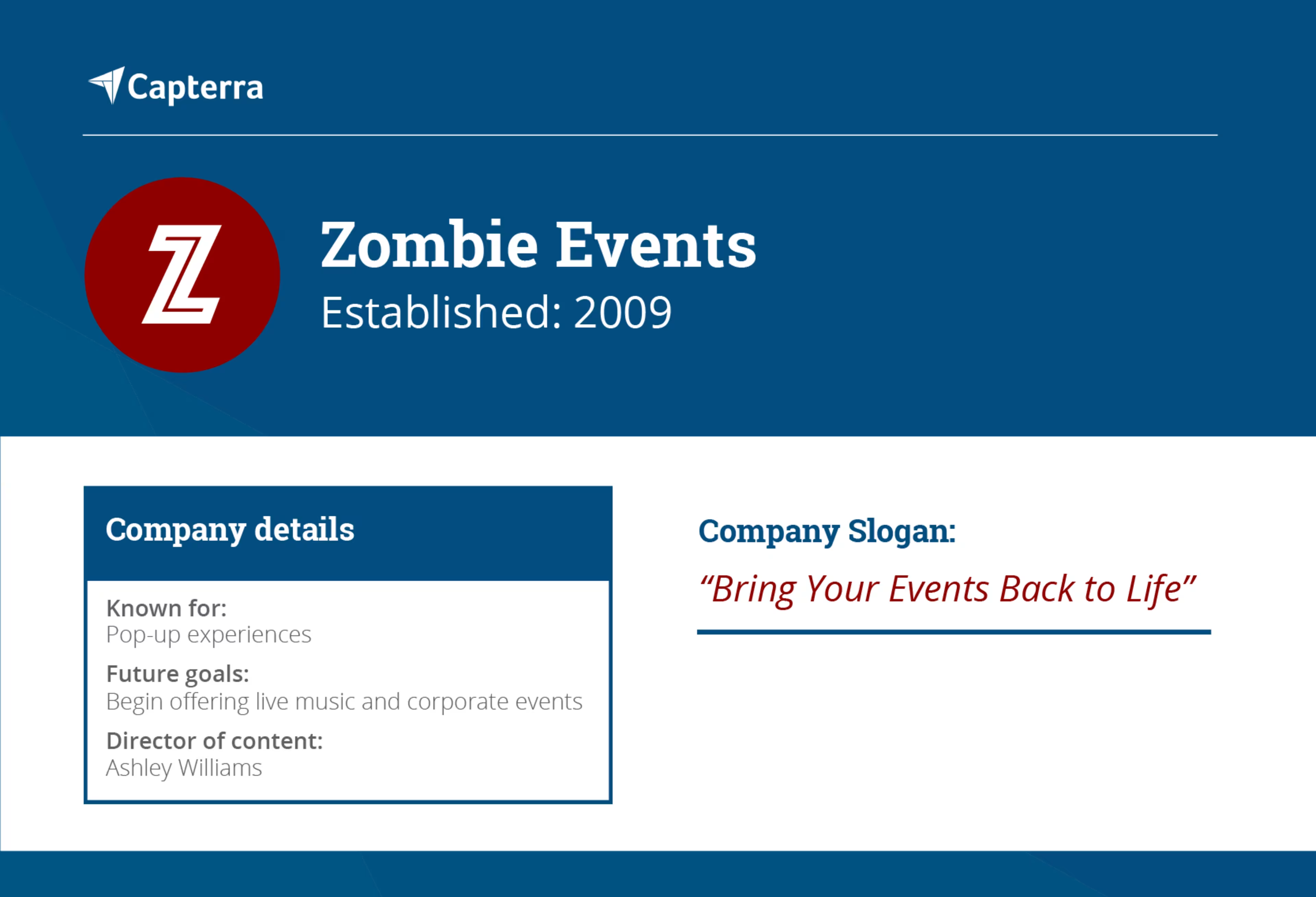In B2B marketing, content is necessary for survival. But if you're not building your content strategy correctly, you may be doomed.

Content marketing is a lot like zombies.
When you're reanimating your dead, you have options: Should they be massive mutants that take out large groups of people on their own? Should they be quick-moving hordes of rage monsters that use their numbers to make an impact? Or should you have small batches of different kinds of the undead?
With content marketing, there are a lot of different approaches to strategy and implementation. You can focus on long-form written content, a plethora of shorter articles, or you can have a mix of video, audio, and written content.
But—and this is a big but—none of it is going to be helpful unless all the pieces of your content strategy align with one another. Your goals need to align with your company's overall goals, your metrics for measuring success, and your strategy for achieving your goals.
To show you how this looks in action, we're going to create a fictional company, build out its content marketing strategy, and have our panel of experts determine the merits of that plan.
Who is our panel of experts? We reached out to 12 small-business leaders in digital marketing and asked them about their best practices for content marketing, then summarized the key themes from their responses and opinions.
Our fictional company and its 3-part content marketing strategy
Let's first build our fictional company.

Ashley Williams is the new director of content marketing for Zombie Events. She's in charge of a team of five content marketers, each of whom cover a different element of the industry.
Ashley's made some changes to the content marketing strategy for Zombie Events. In each of the below sections, we'll look at the goals behind her strategy, the metrics by which she plans to measure her success, and her methods of reaching those goals.
So now let's turn to our panel of experts to see how they feel about Ashley's plan.
1. Set the right content marketing goals
Since she was hired, Ashley has shifted the overall goals of the content marketing team to:
Increase engagement
Decrease dependence on search engine results page (SERP) traffic
Shift away from marketing and toward research-backed content
First, let's take a look at the overall goal for Zombie Events: expanding its event offerings, and therefore, its customer base.
Will Ashley's content marketing goals support the company's? According to our panel of experts, a little bit "yes" and a little bit "no."
WHAT ASHLEY'S PLAN GETS RIGHT: Engagement should always be a major goal of your content marketing strategy. Engagement will help convert leads in the new markets that Zombie Events is trying to tap into.
There's also something to be said for her stated goal of increasing the proprietary data and research-backed content her team produces, as it will help establish the content marketers, and Zombie Events, as authoritative thought leaders in these new markets.
WHAT ASHLEY'S PLAN GETS WRONG: She references a desire to decrease her reliance on SERPs, but in doing so, she's cutting herself off at her knees. Zombie is trying to broaden its customer base, but to effectively do that, it needs to increase its brand awareness in these new fields.
She doesn't mention this, or the subsequent need for increased traffic, in her overall goals. In this way, she falls short. She can't get engagement in this new market without increasing traffic, and the easiest way to generate traffic is through SERP rankings.
A site that ranks in the first spot of a Google search gets 33% of the traffic from that search, according to Search Engine People. That's a lot of eyes on the page which could significantly impact the success of a venture into a new market.
PANEL VERDICT: AN INCOMPLETE START
Ashley's goals don't completely meet the demands of the overall company. Focusing on engagement while setting aside traffic is more in line with a company that's looking to deepen its market penetration where its leads and customers already live.
If you're trying to break into a new market, don't disregard SERPs and don't ignore traffic as a major goal. You'll need it.
2. Figure out the best way to measure success for your content marketing strategy
When you're developing goals for your content, you need a way of determining if you're actually meeting those goals.
To measure the success of her goals, Ashley has informed her team that she'll use the following metrics:
How long visitors stay on the article and the company page.
How many shares articles get on social media.
How readers find the blog.
The inclusion of more proprietary data in the content.
WHAT ASHLEY'S PLAN GETS RIGHT: According to our experts, Ashley's current metrics, or key performance indicators (KPIs), are a good starting place. Time on page and time on site are both incredibly valuable metrics for measuring engagement.
The same goes for her measurement of how people find the content itself. That will help her know whether she's meeting her goal of decreasing dependence on SERP-based traffic.
WHAT ASHLEY'S PLAN GETS WRONG: However, Ashley's team will need to incorporate a lot of other KPIs to accurately know how she's faring at meeting her goals.
For engagement, she should also look at bounce rate, as well as the rate at which people click through to other links on the page.
Another important KPI is the conversion rate for those who view her team's content. That will help inform her how effective her content is at moving people down the sales funnel.
Ashley's reliance on social shares as a metric would be more beneficial for the B2C component of Zombie Events's business, as opposed to the B2B component, due to the comparative lack of social engagement for B2B companies.
While she has not identified traffic as a goal, click-throughs to the site should also be tracked as well as the origin of those clicks (i.e. was it from a Facebook link or a Google search). The more backlinks the content receive, the more domain authority Zombie Events will have, which improves its SERP rankings and helps it net more traffic.
PANEL VERDICT: NOT ROBUST ENOUGH
While Ashley's KPIs will give her a decent understanding about how her initiatives are faring, they aren't enough to give her a complete picture, and certainly not enough to make any informed adjustments.
Make sure that you're choosing an analytics tool that collects data on more metrics than you think you need, so that, should you realize your goals or metrics aren't enough, you'll still have more data to use moving forward.
3. Assign tasks to your content marketing team that help meet your goals
Ashley won't be doing all of this alone, of course. In order to help meet her goals, she's made the following asks of her writers:
Slow down article output to two per month (totaling 10 across the site, per month).
Increase the length of each article.
Focus all content creation on written articles (i.e. no podcasts or videos).
Increase newsjacking pieces (pieces that are inspired by recent events).
Increase input from the SEO team to dictate topics.
WHAT ASHLEY'S PLAN GETS RIGHT: Cutting down on the number of articles and increasing their length is the right way to boost engagement. It'll naturally increase time on page, and by utilizing proprietary data, it will provide increased value to Zombie Events's customers and leads.
This will lead to more backlinks and social shares.
In fact, our panel of experts made it clear that Ashley could narrow it down to five, rather than 10, articles a month and still have the same impact, so long as the quality of information and writing increased commensurately.
WHAT ASHLEY'S PLAN GETS WRONG: Since Ashley is solely focused on engagement, rather than traffic, the newsjacking pieces won't help her cause.
Newsjacking pieces, or pieces that provide commentary on recent events in a particular industry, are helpful for generating traffic and ranking highly on SERPs. But it's the articles that her marketers will base pieces on that will get the social shares and backlinks, rather than the articles her marketers write.
Newsjacking also doesn't lend itself well to long-form articles, because the nature of newsjacking requires pieces be published at too rapid a rate to allow for long-form content.
The biggest thing that Ashley is getting wrong, though, is the lack of audio and video content. Video and audio content provides a vastly improved customer experience for Zombie's leads. Focusing on those content types can increase the usable channels, such as email or social media, for the marketing team.
Video content, especially, is particularly potent. If social shares is a metric that Ashley still cares about, video content is six times more likely to be retweeted than an image on Twitter, according to Lyfe Marketing.
PANEL VERDICT: TOO CLOSED-MINDED
By not being open to other types of content besides long-form articles and newsjacking pieces, Ashley is cutting herself off from a lot of her leads and a great deal of marketing opportunity.
When designing your content marketing strategy, you don't need a lot of content, but you do need a lot of types of content, whether it's articles, infographics, video, or podcasts.
Want to learn about hiring a digital marketing agency for your nonprofit? Our list of the top digital marketing agencies and their features will help you narrow your search. Read more in Capterra’s digital marketing agencies hiring guide.
How do you start building your content marketing strategy?
Before you start building out a new content marketing strategy, look at your company's overall goals.
How can content marketing best serve those larger goals? Set goals that align with them. If, like Zombie, you're expanding into new territory, you'll need to increase your brand awareness, so traffic should be a major priority along with engagement.
Once you have your goals, build out both the metrics that you will use to measure them and the actions that will help you achieve them.
Take a look at some of the articles below to give you a stronger sense of content marketing's capabilities and the importance of alignment to strategy:
6 Beginner Tips and YouTube Examples for Video Content Marketing
6 Secrets to Mobile Content Creation That Will Grow Your Business